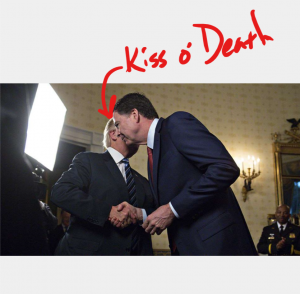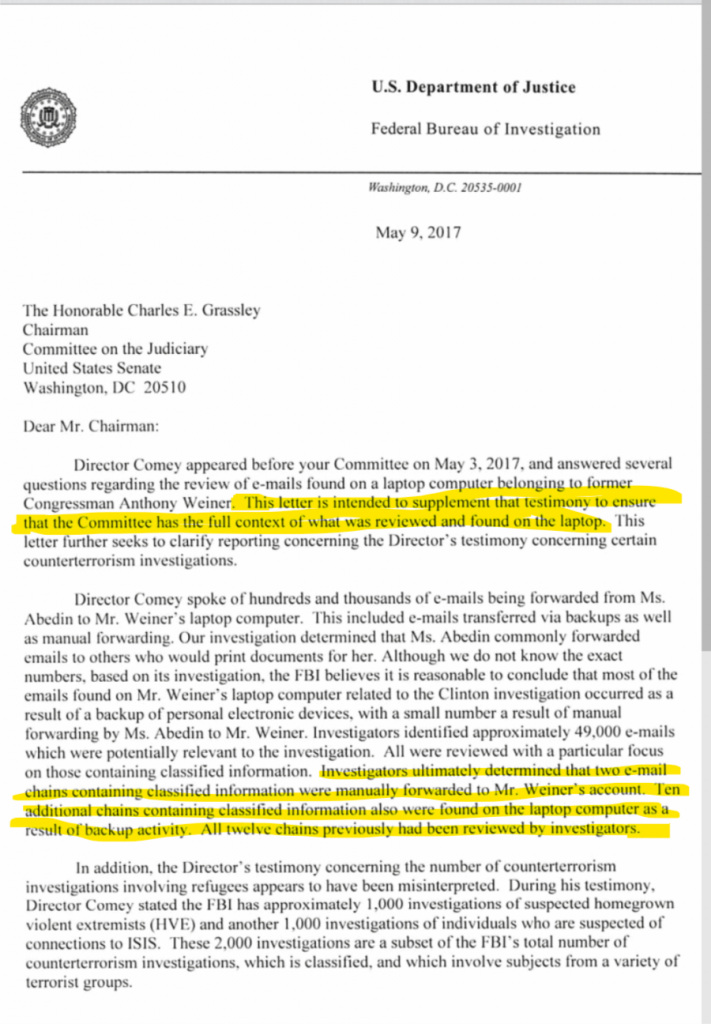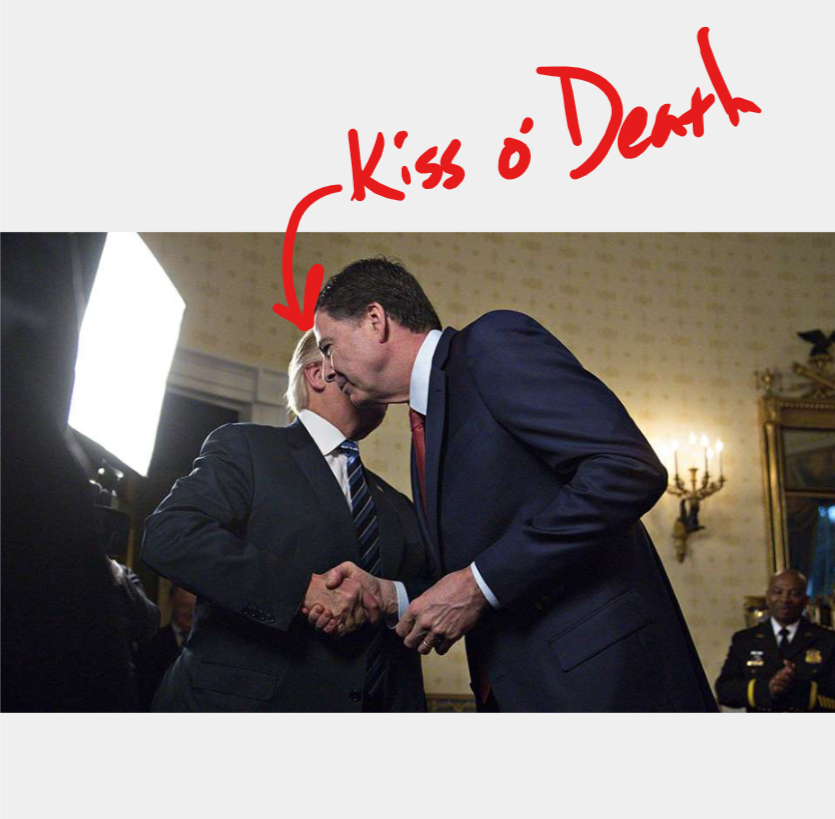 I’d like to imagine that freshly-fired FBI Director James Comey–being a career prosecutor (including prosecuting the Gambino crime family)–was able to see through President Trump’s shtick when they met shortly after inauguration day. Surely, he saw his eventual ouster coming, and, surely, he prepared for it. When Trump kissed him on the cheek, he must have known it was the kiss of death, and that his still-short tenure as Director of the FBI was borrowed time. Barrels of ink have been poured over the years detailing how President Trump’s word is nearly worthless, how his debts are rarely paid, and how nearly everything he touches and everyone he meets are damaged by the encounter.
I’d like to imagine that freshly-fired FBI Director James Comey–being a career prosecutor (including prosecuting the Gambino crime family)–was able to see through President Trump’s shtick when they met shortly after inauguration day. Surely, he saw his eventual ouster coming, and, surely, he prepared for it. When Trump kissed him on the cheek, he must have known it was the kiss of death, and that his still-short tenure as Director of the FBI was borrowed time. Barrels of ink have been poured over the years detailing how President Trump’s word is nearly worthless, how his debts are rarely paid, and how nearly everything he touches and everyone he meets are damaged by the encounter.
Very Little Precedent
That’s what I have to tell myself, at least, because Comey’s unprecedented ouster yesterday afternoon was shocking. FBI Directors, for those who don’t know, get 10-year terms of office on the theory that they are able to operate above the political fray. Granted with exceptional autonomy, the FBI theoretically operates largely independently from the Department of Justice, which in turn theoretically operates largely independently from the White House.
While Comey is not the first Director to be canned by a President–President Clinton had to fire William Sessions due to a ton of abuses within the FBI–he is certainly the first to be discharged while overseeing an investigation into potential collusion between the Trump presidential campaign and the Russian Government.
That Comey was fired during an active investigation obviously leads to comparisons with Richard Nixon, who fired Archibald Cox, the lead investigator on the Watergate scandal. And that Comey’s firing occurred on the same date in history that impeachment proceedings were opened against Nixon is just a little extra frisson of intrigue.
A Complicated Director
This is not to suggest that Comey’s departure should necessarily be mourned. Like many attorneys, he has had to espouse positions that he might not necessarily personally agree with. In other words, while he reportedly refused–as acting Attorney General–to certify the legality of certain aspects of the NSA’s domestic spying programs in 2004, he also–as Deputy Attorney General–endorsed a memorandum certifying “enhanced interrogation techniques” including waterboarding in 2005. (He subsequently stated that he personally felt that waterboarding is torture, but that the Geneva Conventions are vague on the issue.)
More recently, and more notoriously, he inserted himself into the 2016 Presidential Campaign by first, in July of 2016, holding a press conference to state that Hillary Clinton would not be prosecuted about, as Bernie Sanders would put it, her damned emails. But, on October 28, 2016, 10 days prior to the election, he sent a letter–which he knew would be leaked to the press–saying that the investigation was reopening. Just a little. That was followed by a letter two days before the election that said, essentially, “whoops, nothing to see here.”
Even more recently, in very strange testimony to Congress on May 3, 2017, Comey tried to explain his rationale for the October 28, 2017 letter. He claimed that investigators had discovered hundreds and thousands of previously unseen emails, and that he, “Lordy,” had a dilemma. He felt that he either needed to “speak” or “conceal”; there were no other options, in his opinion. (“Conceal,” for what it’s worth, is a terrible word to use by an FBI Director when discussing investigations…) This testimony, however, was…inaccurate, and the FBI has since submitted a follow-up letter to Congress stating that there might have been 2 to 12 email chains which provoked curiosity.

Comey’s behavior during the 2016 campaign led both parties to alternately praise and condemn him. Trump, especially, while stoking his crowds with chants of “lock her up,” called Comey a hero when the October 28 letter was sent to Congress. Despite rumors that Trump might get rid of Comey for failing to recommend prosecution against Clinton, Comey survived the transition.
Canned Comey
Amidst all this, however, was a much larger problem. Russia, according to multiple intelligence agencies, heavily interfered in the 2016 election through troll armies on Twitter and Facebook, generation of fake news, and potentially even more. A number of Trump administration officials have had to resign or recuse themselves for various contacts and omissions about their contacts with Russia.
The investigation into this activity was occurring at the same time the FBI was investigating Clinton’s emails, and the lack of a public statement from Comey is part of why disheartened Democrats are none too pleased with him. By the same token, though, it appears the investigation has heated up dramatically, and CNN reported last night what less-established sources have been saying for weeks: that grand jury subpoenas have been issued out of the Eastern District of Virginia.
The timing of Comey’s firing, then, looks highly suspect. Not to mention the memorandum prepared by freshly-installed Deputy Attorney General Rod Rosenstein focused on Comey’s handling of Clinton’s emails in July and October, and not for anything more recent which would justify the need for an immediate termination. At the very least, one would think that the Department of Justice could have taken Comey to task for providing “inaccurate” testimony to Congress. After all, it’s a federal crime for a person to make materially false statements to Congress in an investigation (18 U.S.C. § 1001).
The stated rationale, however? Looks, feels, and sounds bogus, especially when Comey joins Sally Yates and Preet Bharara as high-ranking officials who have been terminated. Their common denominator? They were investigating Trump campaign ties to Russia.
King Sadim, the Anti-Midas
I’ve no expectation at all that Trump is concerned in the slightest about how his actions appear. After all, he routinely and repeatedly breaches long-established norms. His behavior can appear erratic, and he blithely ignores (or pretends to ignore) reality. (One of these days, I will compile a rolling list of the crazy stuff his Administration is responsible for.) But surely, Comey had to be aware of the President’s reputation, and planned accordingly. Surely he knew he was on borrowed time, and made sure his investigation was in appropriate hands.
If not, then we are all the worse for it.

